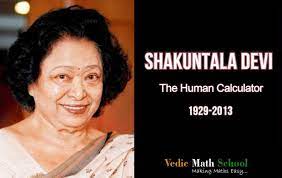
Shakuntala Devi, a mathematical prodigy and accomplished author, was born on November 4, 1929, in Bangalore, Karnataka. She possessed an extraordinary talent that allowed her to perform complex mathematical calculations in her mind at a speed surpassing the capabilities of the computers available at that time.
Her father, who previously worked in a circus, discovered her remarkable ability when he began teaching her card tricks at the age of three. Recognizing her exceptional talent, he made the life-changing decision to leave the circus and embarked on a series of road shows with his daughter to showcase her incredible mathematical prowess. Due to financial constraints, Shakuntala Devi did not receive a formal education. In an interview with Aaj ki Khabar, when asked about the source of her unparalleled talent, she humbly attributed it to “God’s gift.”
During the 1980s, she ventured into the world of politics and ran as an independent candidate in the Lok Sabha elections. She contested from both Mumbai South and Medak in Andhra Pradesh, where she faced off against the former Prime Minister, Mrs. Indira Gandhi, displaying her versatility beyond mathematics.
In 1988, Arthur Jensen, an American psychologist, writer and a professor in The University of California, Berkeley conducted several tests on Shakuntala Devi’s skills and published his findings in the journal named Intelligence in 1980. However, none of the objective tests could decipher how she was able to have such exceptional mental calculation skill and abilities
The journey of being a ‘human computer’
Shakuntala Devi’s journey as a mathematical prodigy began at the tender age of six when she performed her first major show at the University of Mysore. She shouldered the responsibility of providing for her family from a very young age. Recounting her early experiences, she once stated, “I had become the sole breadwinner of my family, and the responsibility was a huge one for a young child. At the age of 6, I gave my first major show at the University of Mysore, and this was the beginning of my marathon of public performances.”
In 1977, Shakuntala Devi made a significant visit to the Southern Methodist University, where she astounded the audience by calculating the 23rd root of a 201-digit number in just 50 seconds. This feat outpaced the performance of the then-fastest computer, Univac 1108, which took 62 seconds to arrive at the same result.
One of her most notable achievements occurred in 1982 when she earned a place in The Guinness Book of World Records. In a demonstration held at the Imperial College, London, she computed the product of two randomly selected 13-digit numbers in less than half a minute, solidifying her reputation as an unparalleled mathematical genius.
In 1988, American psychologist and professor at the University of California, Berkeley, Arthur Jensen, conducted a series of tests on Shakuntala Devi’s exceptional skills and published his findings in the journal “Intelligence.” Despite his efforts, none of the objective tests could fully unravel the secret behind her extraordinary mental calculation abilities.
Jensen suggested that extensive practice in her chosen field likely played a crucial role in honing her abilities. He also noted that Shakuntala Devi perceived large numbers differently from most people, undergoing an almost instantaneous transformation or simplification when confronted with such numbers, a skill that set her apart from the ordinary.
In addition to her remarkable mathematical talents, Shakuntala Devi possessed an extraordinary knack for calendrical calculations. She had the ability to determine the weekday of any date from the previous century. In her book “Figuring: The Joy of Mathematics,” she elucidated some of the methods and techniques behind mental multiplication and calendar calculations, sharing her insights with the world.
Despite her incredible feats and the recognition she received, Shakuntala Devi never embraced the title of “Human Computer.” She firmly believed that the human mind possessed capabilities far beyond those of computers, and she found it inappropriate to draw comparisons between the two. In addition to her contributions to mathematics, she ventured into the field of astrology, harnessing her mathematical prowess for this purpose.
Shakuntala devi passed away on 21st April 2013 due to cardiac arrest. In a society which continues to follow gendered ideas like ‘girls are good in english and boys are good in maths’ the example of Shakuntala Devi is one that shatters such gender assignment of capabilities
Personal life, life as an author
Shakuntala Devi entered into marriage with Paritosh Banerji, an IAS officer in Kolkata, in 1960. However, their union faced challenges, and they eventually separated in 1979 due to personal reasons following the birth of their daughter, Anupama Banerji.
In addition to her mathematical prowess, Shakuntala Devi was a prolific author who penned numerous books on mathematical calculations and ventured into fiction writing. One of her notable works was “The World of Homosexuals,” considered to be the first published academic study of homosexuality in India. In this book, she critiqued the prevailing stereotypes and beliefs surrounding homosexuality in the Indian context.
Renowned queer activist Harish Iyer, in his review of the book, highlighted its progressiveness, especially considering its publication during the late 1970s and early 1980s. He speculated that if Shakuntala Devi were alive today, she might have actively advocated against Section 377 herself.
Tragically, Shakuntala Devi passed away on April 21, 2013, due to a cardiac arrest. Her life serves as a powerful example that challenges entrenched gender stereotypes, such as the notion that “girls are good in English and boys are good in maths,” prevailing in society.

